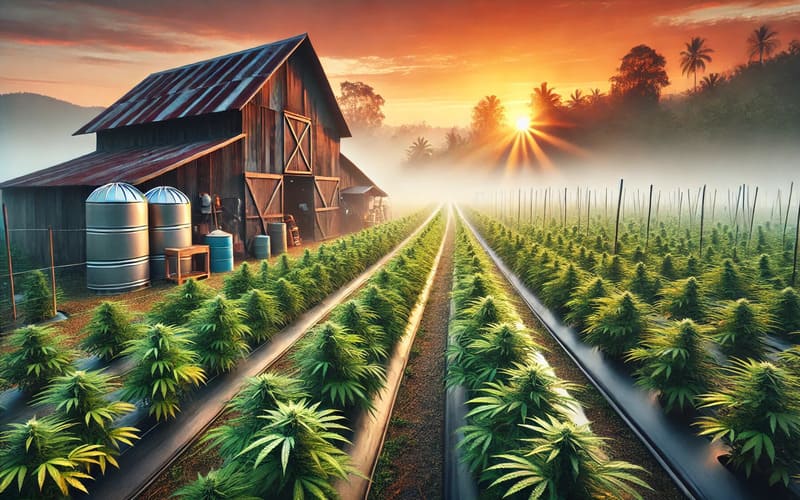Sustainable Cannabis Farming: A Path to Eco-Friendly Cultivation

As the cannabis industry continues to grow globally, the demand for sustainable cultivation practices is becoming increasingly important. With environmental concerns at the forefront, farmers and producers are adopting innovative strategies to minimize their ecological footprint while ensuring the quality and efficiency of cannabis production. Here’s a closer look at how sustainable cannabis farming can revolutionize the industry and benefit the planet.
The Environmental Impact of Traditional Cannabis Cultivation
Traditional cannabis farming, particularly in large-scale operations, can have significant environmental consequences. Key issues include:
- High Energy Consumption: Indoor cannabis cultivation requires substantial energy for lighting, temperature control, and ventilation. This reliance on electricity, often sourced from fossil fuels, contributes to greenhouse gas emissions.
- Excessive Water Use: Cannabis plants require considerable amounts of water, and improper irrigation practices can lead to wastage and depletion of local water resources.
- Soil Degradation: Monocropping and overuse of synthetic fertilizers can strip the soil of nutrients, reducing its fertility and requiring chemical inputs to maintain yields.
- Chemical Pollution: Pesticides, herbicides, and fertilizers used in conventional farming can leach into nearby water bodies, harming aquatic ecosystems and wildlife.
Principles of Sustainable Cannabis Farming
Sustainable weed farm focus on reducing environmental impacts while maintaining profitability and product quality. The following principles guide these efforts:
- Energy Efficiency: Transitioning to renewable energy sources, such as solar or wind power, for indoor cultivation significantly reduces carbon emissions. Additionally, energy-efficient LED grow lights and smart climate control systems can cut down electricity usage.
- Water Conservation: Implementing drip irrigation systems, rainwater harvesting, and water recycling technologies helps conserve water. Monitoring soil moisture levels can also prevent overwatering.
- Organic Practices: Using organic compost, natural pest control methods, and cover cropping enhances soil health and reduces dependency on synthetic chemicals.
- Outdoor Cultivation: Whenever feasible, cultivating cannabis outdoors under natural sunlight eliminates the need for artificial lighting and reduces energy use. Regenerative farming practices further improve soil quality and biodiversity.
- Waste Reduction: Composting plant waste, recycling packaging materials, and minimizing single-use plastics contribute to a circular economy in cannabis production.
Innovative Techniques in Sustainable Cannabis Farming
The industry is embracing cutting-edge techniques to improve sustainability, including:
- Vertical Farming: Growing cannabis in vertical stacks optimizes space and reduces the need for land, making it ideal for urban settings.
- Integrated Pest Management (IPM): IPM combines biological, cultural, and physical pest control methods to minimize chemical use while effectively managing pests.
- Living Soil Systems: These systems replicate natural ecosystems by incorporating beneficial microorganisms and fungi, fostering healthier plants and higher yields.
- Blockchain for Traceability: Blockchain technology ensures transparency in supply chains, allowing consumers to verify that products are sustainably sourced.
The Benefits of Sustainable Cannabis Farming
Adopting sustainable practices offers multiple benefits:
- Environmental Protection: Reduced emissions, water conservation, and soil restoration contribute to long-term ecosystem health.
- Cost Savings: Energy-efficient systems and reduced chemical inputs lower operational costs over time.
- Market Differentiation: As consumers increasingly prioritize eco-friendly products, sustainable cannabis brands can gain a competitive edge.
- Regulatory Compliance: Many governments are implementing stricter environmental regulations. Sustainable practices help businesses stay ahead of compliance requirements.
Challenges and the Way Forward
Transitioning to sustainable farming is not without challenges. High upfront costs for renewable energy systems and advanced technologies can deter small-scale farmers. Additionally, knowledge gaps and resistance to change may slow adoption.
To overcome these barriers, stakeholders can:
- Provide financial incentives and grants for sustainable farming initiatives.
- Offer training programs to educate farmers on eco-friendly practices.
- Foster collaborations between governments, industry leaders, and researchers to develop accessible solutions.
Conclusion
Sustainable cannabis farming is more than a trend, it's a necessity for the industry’s future. By embracing energy-efficient technologies, conserving natural resources, and prioritizing organic practices, cannabis producers can cultivate a greener tomorrow. As consumer demand for sustainability grows, the cannabis industry has a unique opportunity to lead by example and redefine modern agriculture for the better.
โพสตอบ
* ต้องล็อกอินก่อนครับ ถึงสามารถเโพสตอบได้
